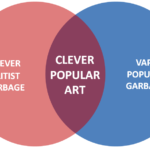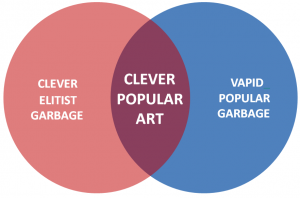
 God knows I think there is a distinction between good art and bad.
God knows I think there is a distinction between good art and bad.
Even so, I find artistic elitists, who snub as “sell-outs” anyone who drifts too far from the cleverly esoteric, to be tediously transparent in their attempt to arrogate the status of Alpha Tribe in whatever cultural kingdom they’re raising colors over.
At the Wall Street Journal, Juliet author Anne Fortier challenges the prejudices of such “literature snobs” who sniff in disdain at anything “commercial” or “ambitious.”
author Anne Fortier challenges the prejudices of such “literature snobs” who sniff in disdain at anything “commercial” or “ambitious.”
Although her critique does lean a bit far to the right for my radically anti-partisan tastes (characterizing public spending in a democracy as “dish[ing] out other people’s money” …. really?) it is a fun read that bops the upturned noses of the literary aristoi.
_
Extra points to the first commenter to accurately explain the title.

 Earlier this week, Carla Nayland conducted a very thorough investigation into the nature of the villain Grendel from the Old English poem Beowulf
Earlier this week, Carla Nayland conducted a very thorough investigation into the nature of the villain Grendel from the Old English poem Beowulf at her Historical Fiction blog. She uses philology, social geography, and plain old imagination to uncover the origin, habitat, appearance, and behavior of this classic monster and his species.

 NUNNERY
NUNNERY 
 God knows I think there is a distinction between good art and bad.
God knows I think there is a distinction between good art and bad.
 From
From 
 A reader’s question to the Seattle Post-Intelligencer‘s “Booktryst” blog leads to
A reader’s question to the Seattle Post-Intelligencer‘s “Booktryst” blog leads to 
 No, nom-de-plume is not French for “snacking on feathers.”
No, nom-de-plume is not French for “snacking on feathers.”
 A couple of weeks ago, I discussed how sampling an existing novel and adding new material (ex:
A couple of weeks ago, I discussed how sampling an existing novel and adding new material (ex: 